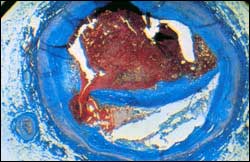Plant sterol pills significantly lower LDL cholesterol

This image shows a blood vessel that has become narrowed due to the build-up of cholesterol and other vessel-clogging substances.
More help for patients already taking cholesterol-lowering statin drugs
A pill containing plant substances called sterols can help lower cholesterol, according to researchers at Washington University School of Medicine in St. Louis.
The researchers studied patients who already were eating a heart-healthy diet and taking statin drugs to control cholesterol. The addition of plant sterols helped further lower total cholesterol and contributed to a nearly 10 percent reduction in low-density lipoprotein (LDL) cholesterol, the so-called “bad” cholesterol. Results of the study were published in the American Journal of Cardiology.
The National Cholesterol Education Program recommends that those with elevated cholesterol eat foods containing plant sterols as a way to lower cardiovascular risk, but many sterol-containing foods are inconvenient for some patients.
Structurally similar to cholesterol, plant sterols can reduce the absorption of cholesterol in the gut by competing with cholesterol to get absorbed and transported into the body. When consumed in the diet, sterols are known to lower cholesterol levels, but sterols are not readily absorbed in the intestine unless they have been dissolved in something that the intestine can easily absorb. Because sterols are not water-soluble, past strategies have involved dissolving them in fat.
Most sterol-containing foods studied so far have been brands of margarine. Studies have found that a daily intake of one or two tablespoons of sterol-containing margarine could significantly lower LDL cholesterol. Some juices and puddings also contain plant sterols.
“One problem is many of our patients already have lowered their intake of fats and calories and don’t use products like margarine on a regular basis,” says Anne Carol Goldberg, M.D., lead author of the new study and associate professor of medicine at Washington University. “In addition, many of these people eat out regularly, and they can’t easily take a particular brand of margarine to a restaurant.”
To deliver the sterols in pill form, the plant compounds were combined with a substance called lecithin and compressed into tablets. When mixed with lecithin, the normally insoluble sterols are able to dissolve in water and get absorbed in the intestine.
Goldberg’s team studied 26 patients who were following the American Heart Association Heart Healthy Diet and taking statin drugs to control cholesterol. Over six weeks, half were randomly assigned to take inactive placebo pills while the rest took sterol tablets. All patients ingested four tablets, twice daily with meals, while continuing to take statin drugs.
After treatment, those who took the sterol pills averaged a 9 percent reduction in LDL cholesterol and a 6 percent decline in total cholesterol. And Goldberg’s team found that the higher the LDL before the study began, the greater the drop in the bad cholesterol.
“Those who started with higher LDL got a bigger response, a bigger drop in their LDL, when they added plant sterols to their regimen,” Goldberg says.
The plant sterols appear to provide an effective way to lower cholesterol levels, especially LDL cholesterol, according to Goldberg. But she says the sterols probably will work best when given as an additional therapy, and she recommends they be used in combination with diet and/or cholesterol-lowering statin drugs.
“This type of treatment would be in addition to dietary changes and other medication,” she says. “There probably are some people who have very mild abnormalities in cholesterol who could get by with a sterol supplement alone, but people with higher cholesterol levels will need medication, too. They’ll take plant sterols in addition to other therapies and benefit from the additive effect we observed in this study.”
Goldberg says it would be useful to try and replicate these findings in larger studies.
“We used a small sample size, but we still saw a significant effect,” she says.
The sterol pills used in the study are not yet commercially available.
Goldberg AC, Ostlund RE, Bateman JH, Schimmoeller L, McPherson TB, Spilburg CA. Effect of plant stanol tablets on low-density lipoprotein cholesterol lowering in patients on statin drugs. American Journal of Cardiology, vol. 97:3, pp. 376-379, Feb. 2006.
This research was supported by Lifeline Technologies and by a Small Business Innovation Research Grant from the National Institutes of Health.
Washington University School of Medicine’s full-time and volunteer faculty physicians also are the medical staff of Barnes-Jewish and St. Louis Children’s hospitals. The School of Medicine is one of the leading medical research, teaching and patient care institutions in the nation, currently ranked third in the nation by U.S. News & World Report. Through its affiliations with Barnes-Jewish and St. Louis Children’s hospitals, the School of Medicine is linked to BJC HealthCare.
Media Contact
More Information:
http://www.wustl.eduAll latest news from the category: Health and Medicine
This subject area encompasses research and studies in the field of human medicine.
Among the wide-ranging list of topics covered here are anesthesiology, anatomy, surgery, human genetics, hygiene and environmental medicine, internal medicine, neurology, pharmacology, physiology, urology and dental medicine.
Newest articles

“Nanostitches” enable lighter and tougher composite materials
In research that may lead to next-generation airplanes and spacecraft, MIT engineers used carbon nanotubes to prevent cracking in multilayered composites. To save on fuel and reduce aircraft emissions, engineers…

Trash to treasure
Researchers turn metal waste into catalyst for hydrogen. Scientists have found a way to transform metal waste into a highly efficient catalyst to make hydrogen from water, a discovery that…

Real-time detection of infectious disease viruses
… by searching for molecular fingerprinting. A research team consisting of Professor Kyoung-Duck Park and Taeyoung Moon and Huitae Joo, PhD candidates, from the Department of Physics at Pohang University…





















